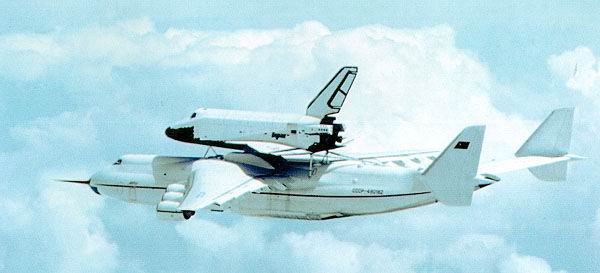| Upload a file | |
| Forums | |
| Utilities | |
| Downloads | |
| Help | |
| Real Aviation | |
| Site map | |
| Design | |
| Become a member | |
| Shop | |
| Links | |
| Fly Online | |
| Guestbook | |
| Virtual Airlines | |
| Report Broken Links | |
| Contribute to site |
|
Aircraft Information An-225 Mriya "Cossack"
|
|||||||||||||
|
The Antonov An-225 Mriya, (translates to "Dream"), built in the Ukraine, has been given the NATO reporting name of "Cossack". It is a stretched derivative of the An-124 "Condor" built for the special purpose of carrying massive "piggyback" cargoes. This huge machine carries incredible payloads of up to 250 tons, offering unrivaled ability to move very large items of freight over respectable distances. But the An-225 has not so far been used to its full potential. |
|||||||||||||
|
The An-225 restores the distinction of being the world's largest aircraft to the Antonov Design Bureau, although the market for such a super heavy carrier remains open to debate at present. |
|||||||||||||
|
Based on the huge An-124, itself larger than the U.S. C-5 Galaxy, but with a 50% improvement in payload, the An-225 is simply the largest aircraft ever built, and flown more than once. The An-225 added 50 feet to stretch the fuselage, 6 engines instead of 4, and 7 pairs of wheels per side instead of 5. It also utilized a newly designed wing root assembly to support a 50 foot increase in wing length. This flying enigma was developed to replace 2 Myasischev VM-T Atlantis, converted "Bison" bombers, used to carry outsized loads associated with the Soviet space program's Energia rockets. The sole An-225 first flew on December 21st, 1988 and made an unprecedented appearance with the Buran space shuttle on its back on May 13th, 1989 at the Paris Air Show. The An-225 appeared at a time when Soviet aviation was at it's peak, and new designs were stunning Western analysts at every air show. |
|||||||||||||
 |
|||||||||||||
|
An Antonov update program involves the addition of modern navigation and communication avionics, a collision avoidance system, and modifications to reduce the noise signature of the aircraft. First flight of the modified An-225 was on 7 May 2001. If the An-225 proves commercially successful, Antonov may update the other An-225 as well. Unlike earlier Antonov designs, the An-225 has no rear cargo doors, relying on a hinged nose instead. As well as being the main cargo loading area, the nose contains weather radar and downward-looking terrain avoidance and ground mapping radar. The nose wheel assembly also "kneels". As it retracts on the ground, it enables greater access to the cargo bay for extremely long freight modules. The 7 pairs of main bogies, on each side are needed to support the massive weight of the aircraft and it's cargo. This unique design has the added feature of rear wheel steering in the aft 4 wheel assemblies. But, with the breakup of the USSR, the crumbling of the Russian space program meant that it is an aircraft without a job. Most of the colossal Mriya's career has been spent in storage and it has been cannibalized for parts. Plans to make it a launcher for Britain's HOTOL spacecraft have failed to materialize. A second example of the An-225 remains uncompleted and unwanted. However, as the An-124 has proven profitable in the commercial heavy-lift market, the An-225 is now being offered for the same work. The Antonov bureau has refurbished one of the An-225s for commercial operations, including transport of bulky cargoes and outsized materials. |
|||||||||||||
|
A cloud forms across the wing of the An-225 under humid, low-pressure conditions. |
|||||||||||||
|
An-225 Mriya "Cossack" Specifications
|
|||||||||||||
 |
|||||||||||||
|
COMPARISON Nothing even comes close to the An-225. Even the An-124 can only carry 60% of it's payload. The Mriya's payload weight is actually equivalent to the weight of one and a half empty C-5 Galaxies.
Take-off distance is dictated by the size of the ship. The larger the aircraft, the longer it usually needs to get airborne. Even with it massive wing and 6 engines, the Mriya still takes off in a long distance, but not much more than it's brother or the C-5.
|
|||||||||||||
|
Factoids
|
|||||||||||||
 |
|||||||||||||
Compiled by Al Fischer, Reno, Nv

